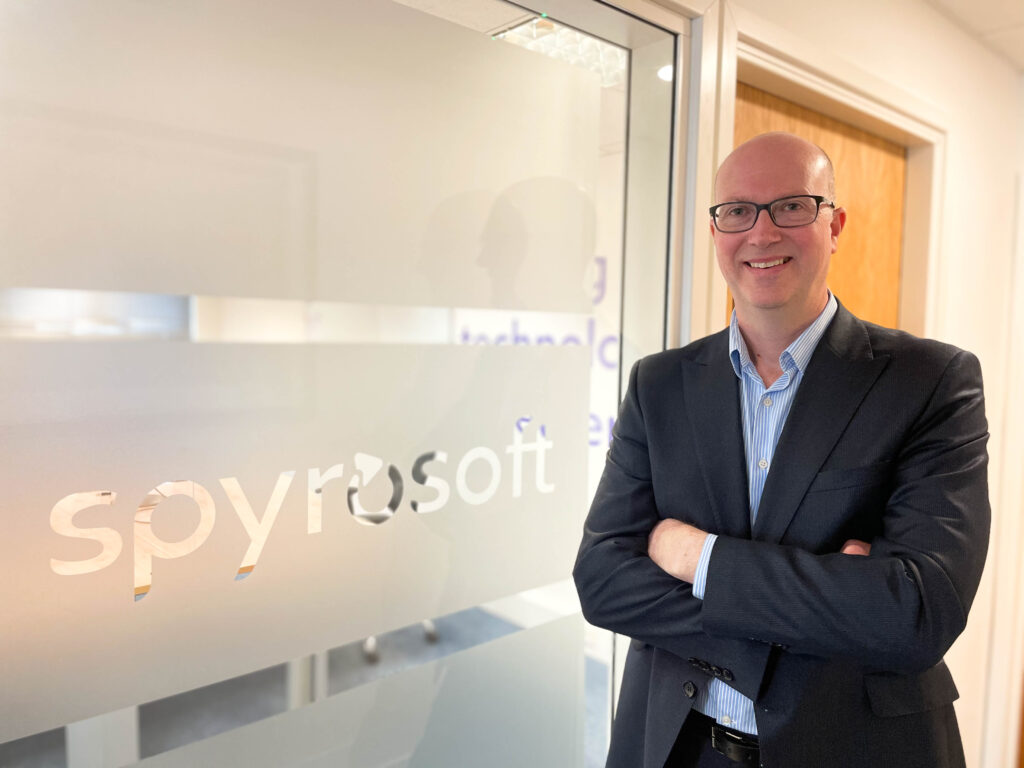Duncan Johnson about the CIO100 award, his priorities and goals for the future as the COO of Spyrosoft UK
The COO of our UK branch, Duncan Johnson, has been recently recognised in the list of “Top UK CIOs” of 2021. The award is given to the most transformational and disruptive CIOs, in and from, the United Kingdom, who drive change at their organisations through their extraordinary achievements. It’s a huge acknowledgement for him, but also for our Spyrosoft UK and Spyrosoft teams.
To mark this occasion, I asked him to share his thoughts on the award, what’s the mission of a CIO from his perspective and his role as a COO of Spyrosoft UK?
The CIO100 recognises organisations and teams that represent enterprise excellence. What does this term mean to you?
From Spyrosoft’s perspective, it’s delivering excellent services from excellent people, meeting the demands of the clients to an 11/10 standard – always do more than they expect. I think that an excellent enterprise is based on excellent people. You have to have the right people – not just in technology, but also in Marketing, in HR, in Finance, in Recruitment – in all parts of your business.
I also think that every enterprise has a responsibility to help out in non-profit areas especially in your local community. The key areas for me at the moment include social value, sustainability and diversity. Though non-technical, they are very important to me and all of us at Spyrosoft.
What do you see as the CIO’s top priority?
It’s three things for me. First of all, using technology to help recover from the pandemic, whether that’s helping health organisations be more efficient or building life-saving solutions. We must also consider sustainability, diversity and social value and you must keep great people at the centre of your organisation. It’s really all about finding great people, even though it’s hard to recruit at the moment, this must remain key.
In Spyrosoft UK, we put a lot of input into social value. We make charitable donations and arrange things including food bank donations in the office or sponsoring local community causes/clubs. Little things can make a big impact, so I’d like to see more CIOs focus on that.
What type of leader are you and what are your goals as a Chief Operating Officer?
I think of myself as a relaxed type of leader. I like to trust in people, and I like them to make their own path, their own decisions and mistakes to learn from, but I am always there to support, help or mentor them. I’m not the type of leader who gets involved all the time or who will ask you ten questions an hour. I like to give people the ability to move forward themselves, to find their own way of doing things.
My goal as a Chief Operating Officer is to grow Spyrosoft UK as part of a wider group, to support the global strategy that we have for the company to grow together. I’d like to try to keep the culture that makes Spyrosoft great and I’d like us to develop both the UK client base and the UK team. A very important part of my role is to support Andrew [Radcliffe, co-founder of Spyrosoft, Supervisory Board member and our UK CEO at Spyrosoft UK], who as a co-founder, plays a key role in the company globally, from the operational side of Spyrosoft.
How do you see our company in 5 years and what are the directions we want to take?
The next 5 years will be very exciting. I believe we can grow up to 2000 employees globally. As we get bigger, it’s very important to me to keep the culture and to grow the company on solid back-office and operational functions, which will become even more crucial. It’s great to have a house of engineers, but you also need good marketing, HR or finance around it. If there are poor foundations, growing the company becomes a challenge.
How has the tech landscape changed since you started working in this industry?
A lot has changed since then. I learned in the bad old days of technology when it was all very different. These were the times when you used the dial-up modem, which would disconnect completely if someone went on the phone in your house. My first real technology role was working on a trading floor for a large Swiss bank, where people would throw keyboards or telephones at me.
Some of the biggest technology providers didn’t exist. At that point, Apple came out with what would become the Macbook. These were the days of big providers, like Sun Microsystems, which is a part of Oracle now. Mobile phones were the size of house bricks and you built PC’s from bits you bought at Maplins. The technology landscape has changed amazingly from my perspective, and bear in mind, I have never been a developer. One of the things why it works with Andrew and I is that I came from the operations side, whilst Andrew has a coding/development background. I don’t think you could imagine what would happen when I was working in technology. These were very, very different times. Windows NT and Windows 3.0 were around back then. Windows 11 has been released recently! That’s how long ago it was. I actually remember the Windows 98 release being a big thing. Many things have changed dramatically, but many things have stayed the same: good customer service, reliability, stability, good code, databases. They may look different now, but in general they are still the same. You might’ve coded in C and now it’s C#. It might have been Windows NT then, but it’s Windows 11 now. Some things are not that different, we just call them different things.
Good customer service is as true now as it was back then.
What advice would you give to someone who wants to follow your path and become a Chief Operating Officer? What are the skills they should develop?
I genuinely believe that we have one role in technology: to help. All we do is help people. We help build amazing solutions for people. We help people run their businesses more efficiently with good technology. If you never get above your station and you always bear in mind that we are here to help, as long as you never forget that you’ll always do a good job. You’re helping people, you’re helping businesses, you’re helping find new technologies. Across Spyrosoft, there are some very, very talented people who are helping organisations deliver solutions and find answers. No matter if you start at the service desk, or you start as a junior developer, or you start in a support function – if you remember you’re here to help, then I think you can go far.
The biggest skill to develop to become a COO? It has to be communication skills. You have to be able to talk to everybody. I tell my children this (I have three teenage daughters): they have to be able to talk to anyone, whether they’re the CIO of a big company or someone who is junior and has just started their career. I think it’s really important. You have to develop your communication skills, even though it may not be easy for some individuals. Some people can’t talk to anybody, but I’m trying to get my children to do it. If three teenage girls can talk to anyone, I’m sure anyone can. It’s good life advice too, not only business-wise.
To be the COO, you don’t have to be the most technical person. There will be many people more technically skilled than me across Spyrosoft, but you have to understand enough that you could grasp what they’re talking about and to help them make decisions.
About the author
RECOMMENDED ARTICLES

